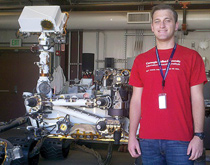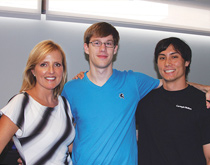 Brandon Wolfe intently writes computer code at the Software Engineering Institute—he’s a Carnegie Mellon student, so that should be no surprise, right? More surprising: His code is helping to build internal network defense to secure government data. Meanwhile, across the country, Bujar Tagani works with a team at the Jet Propulsion Lab, writing encryption software to protect sensitive data in NASA’s ground systems. Both students are fighting the ongoing battle against hackers, who might want to steal Social Security numbers, or take control of the Mars Rover using NASA software, or even tamper with larger infrastructure such as power grids or water supplies.
Brandon Wolfe intently writes computer code at the Software Engineering Institute—he’s a Carnegie Mellon student, so that should be no surprise, right? More surprising: His code is helping to build internal network defense to secure government data. Meanwhile, across the country, Bujar Tagani works with a team at the Jet Propulsion Lab, writing encryption software to protect sensitive data in NASA’s ground systems. Both students are fighting the ongoing battle against hackers, who might want to steal Social Security numbers, or take control of the Mars Rover using NASA software, or even tamper with larger infrastructure such as power grids or water supplies.
 Dena Haritos Tsamitis, director of the Information Networking Institute (INI), knows that these kinds of nefarious plots can “bring a nation to its knees”—which is exactly why students like Wolfe and Tagani are working around the world to keep American citizens safe.
Dena Haritos Tsamitis, director of the Information Networking Institute (INI), knows that these kinds of nefarious plots can “bring a nation to its knees”—which is exactly why students like Wolfe and Tagani are working around the world to keep American citizens safe.
They’re all part of CyberCorps Scholarship for Service (SFS), which is a federal program that aims to strengthen the workforce charged with protecting the nation’s critical information infrastructure. Since 2001, Carnegie Mellon students have honed their skills through SFS; in exchange for tuition, they commit to summer internships and at least two years of government service after graduation. Working on both cybersecurity offense and defense, SFS graduates provide public service through the Federal Bureau of Investigation, Central Intelligence Agency, National Security Agency, Department of Justice, and more. 157 SFS scholars have graduated thus far.
Now, thanks to a grant from the National Science Foundation, even more students will have a chance to work with Tsamitis, who serves as Principle Investigator on SFS. Carnegie Mellon was one of 23 schools to receive SFS funding in 2014, and CMU tops the list with the largest award: $5.6 million. The eligible information security graduate students are either from the College of Engineering or the Heinz College and must be U.S. citizens.
The grant will also enable a faculty member and PhD student to participate in a multi-university research network called Information Security Research and Education, which engages in collaborative research in cybersecurity.
—Julie Albright (DC’92)



